Information sessions and related content
The 'Postdoc Life' series of information sessions was introduced in January 2023 following the September 2022 Research Staff Survey, which showed that research staff found it difficult to understand 'how things work at Queen's' and what is available to them.
It aims at highlighting some of the internal and sector developments and initiatives to postdocs and research staff, in order to help them better understand and navigate their direct (Queen's) and wider (UK Research and Innovation sector) environment.
Sessions are organised approximately once per month, bringing in internal (or external) experts on the topic, and all postdocs and research staff can suggest topics by contacting the PDC (pdc@qub.ac.uk).
The sessions are provided on Zoom, enabling participants to ask questions to the facilitators.
Notes about the recordings on this page:
- Videos are only viewable by Queen's staff and students
- Links to videos open them in the Mediasite/Panopto player on a new page. Chapters and captions are available
- Details and links related to the content are provided for each video; click '+ expand' to access them
- The information provided in videos was true at time of recording but, depending on when you are watching them, details may have changed
- Questions and Answer parts of the sessions are not always included in the videos
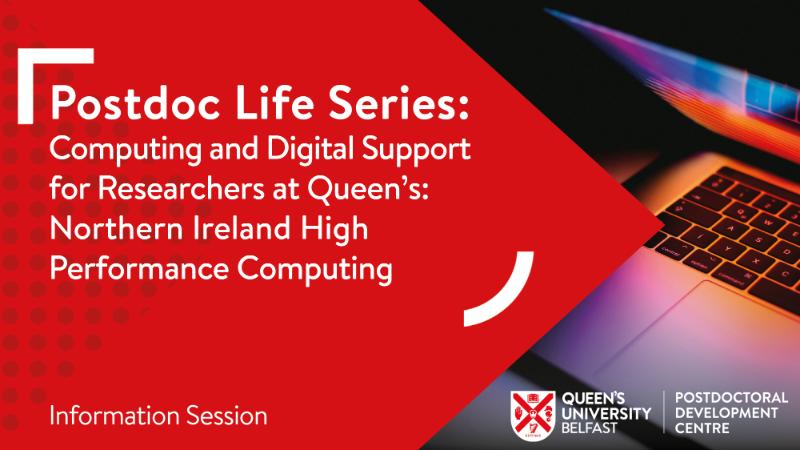
This session was delivered by staff from the Northern Ireland – High Performance Computing (NI-HPC) Team and QUB's Sustainability Team. It introduces the free high-performance computing support and resources available to researchers at Queen’s through the Kelvin2 Cluster and provides information on the sustainability considerations of performing research, including an overview of the LEAF and Green DiSC programmes.
Watch 'Postdoc Life: Computing and Digital Support for Researchers at Queen’s'
More about NI-HPC
Research computing covers many areas including the use of powerful supercomputers and management of data. QUB have a central team known as NI-HPC (Northern Ireland - High Performance Computing) whose role is to help researchers with their computer needs and data requirements.
Typically, researchers use a supercomputer whenever their computer needs will not run on their local PC. This could mean the local PC does not have enough CPU cores, RAM memory, hard disk space, the software required or it is just too slow in calculating results.
No matter what your technical skills the NI-HPC team are there to help. They offer training and/or a personal service to guide you through the process of using Kelvin2.
For queries contact James McGroarty (J.McGroarty@qub.ac.uk) or Zara Birch (z.birch@qub.ac.uk).
Further Resources:
- High Performance Computing (Kelvin Cluster 2, HPC Service)
- NIHPC Documentation
- NI-HPC Training and Events
- Women in HPC
- Sustainability at Queen’s
- Laboratory Efficiency Assessment Framework (LEAF) at QUB
- LEAF Resources
- Lap Repair Fund Application Form
- Green Revolving Fund Application Form
- Queen’s Green Fund (Information/Resources)
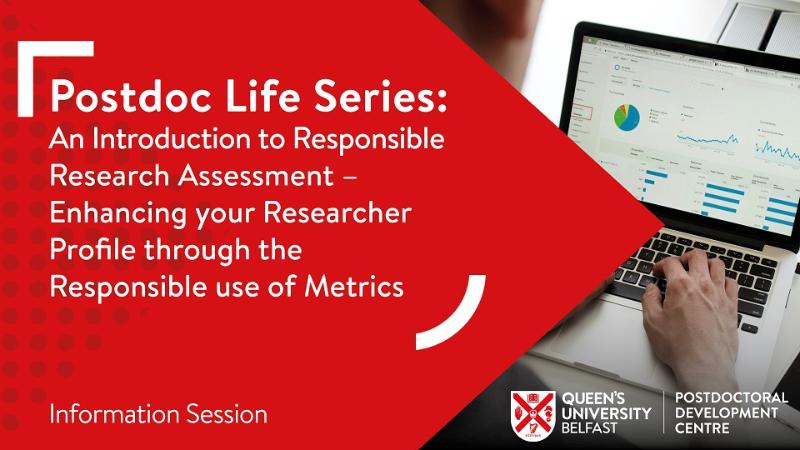
The recording of this session provides information on Queen's Institutional Responsible Research Assessment Policy and outlines the policy's key principles, common publication metrics and indicators and offers advice on how to enhance your research profile through the responsible use of metrics.
Watch 'Postdoc Life: An Introduction to Responsible Research Assessment'
Watch our introductory session on Responsible Research Assessment (RRA) for postdocs and research staff to learn how to effectively showcase high-quality research beyond traditional metrics.
In this session, the Research Quality Team introduce the following concepts:
- Queen’s Responsible Research Assessment Policy: The core principles of Queen’s Institutional Responsible Research Assessment Policy and how it supports diverse and inclusive research cultures.
- Publication Metrics: Using quantitative metrics responsibly, ensuring they complement qualitative assessments.
- Responsible Research Assessment in Action: How the adoption of narrative CV formats by major funders emphasises assessing researchers’ impact and academic contribution as a whole.
- Maximising Your Researcher Profile: utilising persistent identifiers and online repositories, including Queen’s repository, Pure, to enhance your visibility and showcase your work effectively.
- Monitor Impact and Engagement: tracking your publication impact and engagement using tools like Altmetrics and research intelligence platforms.
The session was facilitated by Nicole Murray, Research Quality Manager and Dr Mary Stevenson, Research Policy Assistant from the Research Quality Team at Queen’s.
Additional Resources:
- R&E SharePoint: Responsible Research Assessment
- R&E SharePoint: Pure Support
- R&E SharePoint: Maximising your Research Profile (Mentoring Guide)
- SciVal Benchmarking Guide
- UKRI Résumé for Research and Innovation
- The Royal Society: Résumé for Researcher
- UKRI: The Metric Tide
- LibGuides: Persisdent Identifiers: ORCiD
- LibGuides: Research Data Management/Sharing my data in Pure
- Scopus
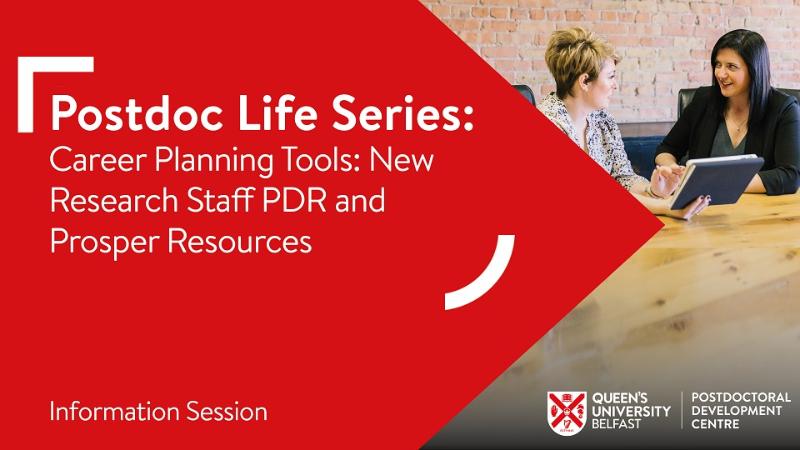
The recording of this information session designed for postdocs and research staff provides them with information on the new bespoke PDR form and guidance introduced in 2024, as well as the free Prosper portal and how it can help them plan their career and PDR meeting.
Watch 'Postdoc life: Career planning tools - new research staff PDR and Prosper resources'
The Personal Development Review (PDR) is a mandatory process for all staff at Queen's; it is centered around a conversation between a member of staff and their line manager, focusing on discussing their development and career plan, to allow them to deliver their role and achieve their career goals.
In 2024, the PDC is introducing new Personal Development Review (PDR) resources, including a new form and guidance documents and videos for research staff and their managers. These new resources were designed to improve the benefits of the PDR for research staff, by including useful self-reflection elements and structuring the conversation to focus on career and personal development, including planning the use of the 10 career development days research staff are entitled to. They were based on research staff feedback (from surveys and local representatives) and refined following a successful pilot in 2023 with postdocs and line managers across the three Faculties.
This information session includes a presentation by Dr Alice Dubois (PDC Manager / Research Culture Manager) describing the PDR process and showing the new resources, as well as a demonstration of the Prosper portal, delivered by Dr Stefania Silvestri from the Prosper team. The Prosper portal is a career development tool created especially for postdocs and includes a lot of self-reflection, career exploration and career planning resources that can be especially useful when preparing for the PDR or included in actions to address development goals in the PDR.
Details (access chapters in the Panopto viewer):
-
Introduction
- What is a Personal Development Review (PDR)?
-
PDR cycle and practical responsibilities
-
Benefits of engaging with the PDR and career planning
- Why are research staff getting a new PDR form this year?
- What is changing?
- Signposting
- Preview of the new PDR form
- Preview of the guidance for reviewees
- Demonstration on where to find the resources on the PDC website
- Prosper: introduction of Stefania Silvestri
- Start of Prosper presentation
- What is Prosper?
- Prosper's history
- Preview of the Prosper portal
-
Q&A:
- Should I have a PDR if I've just started my contract?
- Is it mandatory to discuss career plans?
For further information:
- PDR for research staff (form and guidance; PDC website)
- PDC Career development page
- Postdoc Group Mentoring Scheme
- Prosper portal
- Career development navigator (Prosper)
- Practice self-reflection (Prosper)
- Find your skills (Prosper)
- The world is your oyster (Prosper)
- Networking is king (Prosper)
- Be inspired by former postdocs (Prosper)
- Be inspired by former postdocs (PDC podcast)
- Career conversations with your line manager (Prosper)
- Embrace career planning (Prosper)
- Register to track your career development progress (Prosper)
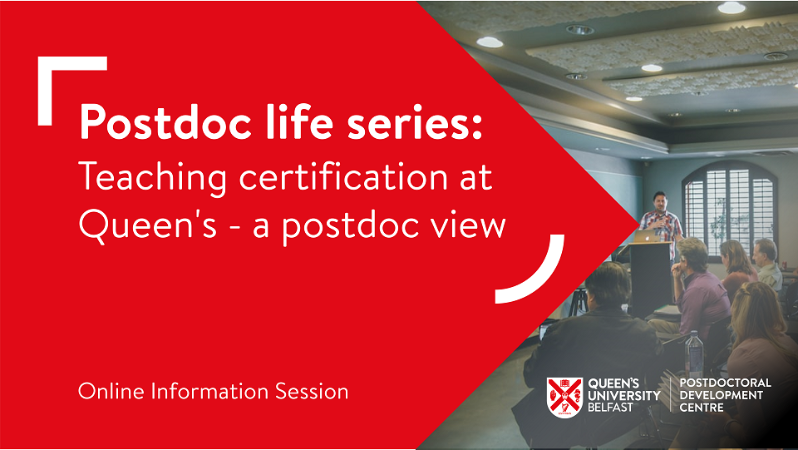
The recording of this information session designed for postdocs and research staff provides them with information on teaching as a postdoc and on how to obtain an HEA Fellowship certification, focusing on the free internal 'Queen's Merit Award' process. This includes a short presentation followed by a panel discussion with three postdocs sharing their own experience of the process.
Watch 'Postdoc life: teaching certification at Queen's - a postdoc view'
This information session includes a panel discussion preceded by a short presentation to introduce the HEA Fellowship scheme and Queen's Merit Award (QMA), which is the free internal process to obtain the Associate-Fellowship of the Higher Education Academy (AF-HEA) teaching certification at Queen's.
The three postdoc panellists - Dr Claire Tonry (AF-HEA, Wellcome-Wolfson Institute for Experimental Medicine), Dr Victoria Cairnduff (AF-HEA, Centre for Public Health), and Dr Prabhath Piyasena (AF-HEA, Centre for Public Health) - discuss why they engaged with teaching, how they accessed teaching opportunities as postdocs, what they delivered, how the QMA works, how they prepared their application, and any other tips they feel would be useful to other postdocs willing to apply for teaching certification.
Gaining teaching experience and awareness of good teaching practice in higher education is key to research staff aiming at an academic career. This session provides first-hand information based on the experience of postdocs who recently engaged with it.
The discussion is facilitated by Dr Alice Dubois, PDC Manager at Queen's.
Details (access chapters in the Panopto viewer):
-
Why teaching
- Some advice
-
Advance HE (HEA) Fellowships
-
Routes to certification
-
Panel discussion:
- Introduction of panellists
- Panellists' teaching activities
- How to find teaching opportunities as a postdoc
- Understanding the 20 hours eligibility rule of the QMA
- Managing teaching time commitment alongside research
- Practicalities of applying to the Queen's Merit Award
- Support preparing the application
- Work and time commitment to prepare the application
- References
- Timing of the writing sessions
- Last tip from the panellists
For further information:
- PDC Teaching and supervision page
- Queen's Merit Award page (Centre for Educational Development website)
- Advance HE website
- Postdoc Life session recording from February 2023 'Professional Development & recognition in Higher Education teaching' (includes presentation from Karen Fraser, mentioned by the panellists)
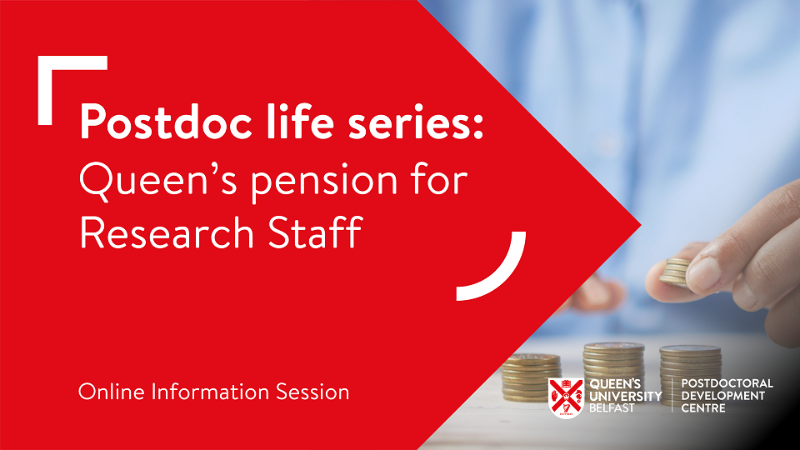
The recording of this information session designed for postdocs and research staff provides information on their pension, the benefits it brings (including beyond retirement income) and what to do if they leave the university to fully benefit from it in the future.
Watch 'Postdoc life: Queen's pension for research staff'
All research staff are contractually enrolled into the Universities Superannuation Scheme (USS) at the commencement of their employment at the University, in order to provide them with a pension.
Each month, employees and the University both contribute to USS, to provide staff with a guaranteed income when they retire, which is paid for the rest of their lifetime. Staff will also receive a one-off tax-free lump sum at the date of their retirement. USS members receive other benefits, such as a life insurance cover of 3 times their salary, which would be paid to their family should they die as an active member of USS. USS provides online tools on My USS to estimate pensions at members' retirement date and to enable them to manage their contributions, potentially investing more now to increase their tax-free lump sum at retirement or monthly pension payments. This video describes all this, and provides guidance on your options when you leave the University, for example to work at another university in the UK, an employer in a different sector, or a different country.
The video is presented by Ciara Smyth, Pension Manager from the Finance Directorate at Queen's.
Details (access chapters in the Panopto viewer):
-
Welcome and introduction
- Agenda
-
Benefits of being a member of the USS scheme
-
Retirement Income Builder (1 Apr 2016 - 31 Mar 2024)
-
Retirement Income Builder (Post 1 Apr 2024)
-
Retirement Income Builder - example
-
Investment Builder - Investment choices
- My USS
-
How to estimate your USS benefits
-
USS Retirement Options
- Retirement
- Potential sources of income
-
Your next steps
- Find out more
- Further information
- Questions? (What to do when leaving Queen's for another employer and/or to another country? Should I bring my multiple small pensions together? Understanding the salary sacrifice and contribution refund. Are additional contributions and the investment builder the same thing? What happens when I'm on maternity leave? Do I have life cover for my mortgage as part of my pension already? When I retire, is the pension paid monthly or yearly? When do you 'get your money back', 5 years guarantee and benefits for dependents. Am I better investing via a savings' account? Is there an upper limit to my pension? Can you invest a lump sum into the investment builder?)
For further information:
- Queen's pension pages
- USS website
- My USS
- Retirement policy (People & Culture)
- Money and pensions service, Pension wise (Money Helper), State pension (gov.uk), Workplace and personal pensions (gov.uk)
- Financial advice: unbiased.co.uk
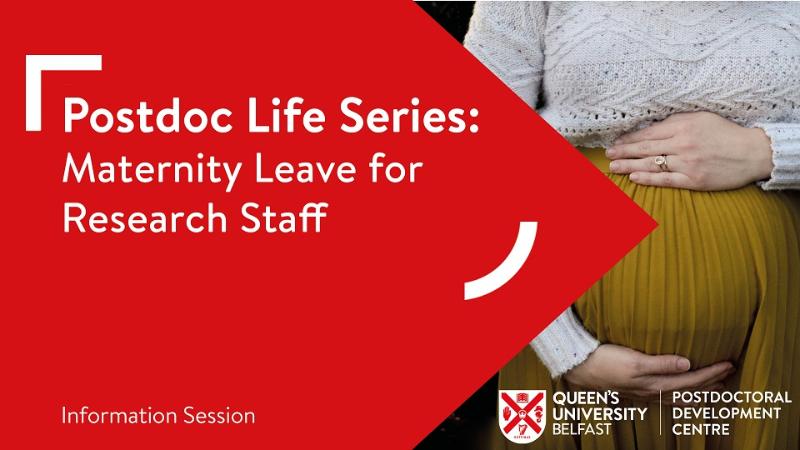
The recording of this information session designed for postdocs and research staff provides information on the University's maternity leave policy, how it applies to staff funded through research grants, as well as showcases some facilities and initiatives available at Queen's to new parents.
Watch 'Postdoc life: Maternity leave for research staff'
While the University's maternity leave policy is the same to all pregnant staff members, it can be difficult for research staff, mainly employed on fixed-term contracts funded by external research funders, to understand how it will affect the length of their contract and their contract end date. The answer depends on the funder and the specific situation, and the session will cover a few examples to clarify the process. It will also mention additional concepts, such as health and safety, attending pre-natal care appointments, 'keep in touch' days, using annual leave to extend a period of leave or for a phased return, length of leave and pay etc.
Additional benefits available at Queen's, such as enhanced maternity pay, childcare facilities, tax-free childcare and breastfeeding/milk expression facilities will also be discussed.
The video is presented by Clare Carson (HR Business partner) and Heather Callighan (Diversity and Inclusion Officer) from the People and Culture Directorate at Queen's.
Details (access chapters in the Panopto viewer):
- Glossary of terms
- Before maternity leave
- Maternity pay (QUB enhanced entitlement)
- Notification
- Antenatal care / appointments
- Health and Safety at work during pregnancy
- Communication - during leave
- Keeping in Touch (KIT) days
- Planning your return
- Breastfeeding at Queen's
- Childcare
- Flexible working and agile working
- Support for parents
For further information:
- Queen's Maternity Leave information (People and Culture intranet); includes academic and research staff FAQs and case studies
- PDC work-life balance page: this webpage contains signposting and information on University policies and external resources relevant to work-life balance, as well as maternity related tips
- Parents and caring page: this QUB People and Culture webpage includes information on policies and services to support parents and carers
- Shared parental leave information
- People and Culture work-life balance policies: includes policy documentation and application forms for e.g., Parental and Shared Parental Leave, Fertility Treatment Leave and Adoptive Leave etc.
- Breastfeeding facilities
- Childcare at Queen's
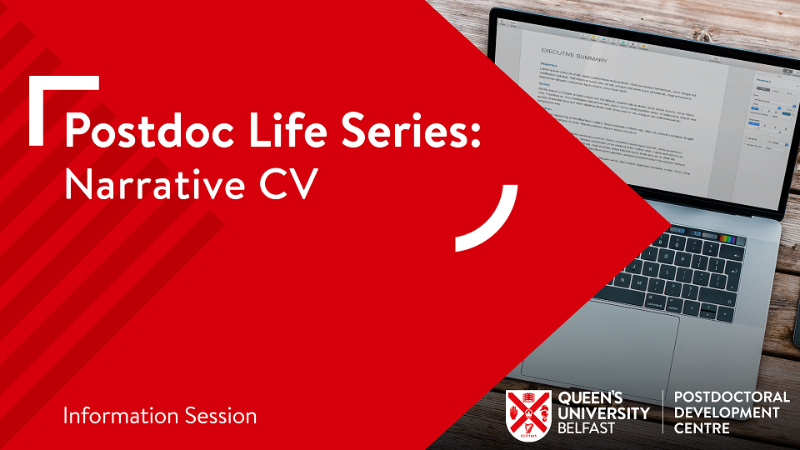
The recording of this information session designed for postdocs and research staff provides some background information on the new 'Narrative CV' format that is becoming increasingly used by research funders to assess grant applicants, and is likely to influence other aspects of the research & innovation sector. It also includes guidance on how to prepare a narrative CV.
Watch 'Postdoc life: Narrative CV'
The introduction of the Narrative CV is part of a drive by the Research and Innovation sector to improve Research Culture, notably by recognising the importance of a wider range of contributions by researchers and moving away from using inaccurate and narrow metrics as indicators of research quality. Main UK research funders are adopting the Narrative CV or ‘Résumé for Research and Innovation’ for their funding calls, with UKRI committing to using it across all their schemes by the start of 2024. The Narrative CV aims to shift emphasis away from reliance on limited performance indicators such as funding, impact factors, and citations, and instead allow for a more inclusive and appropriate description of varied career pathways, contributions, experience, and a broader range of outputs. Beyond funding, research institutions are investigating how similar principles could apply to other aspects of research assessment, such as academic progression.
The format for each funder is somewhat different but all Narrative CVs are based on the Royal Society Resume for Researchers, and include headings such as: 'Independent contributions to the generation of new ideas, tools, methodologies or knowledge', 'Leadership in the development of others and maintenance of effective working relationships', 'Contributions to the wider scientific community and research and innovation culture' and 'Impact on the broader scientific community beyond your field and exploitation of research towards wider societal benefit'. it focuses on the impact and significance of your activities and research, not just a list of your achievements.
As the narrative CV format is rapidly being rolled-out across UK funding calls, including all UKRI calls by the end of 2023, all researchers interested in applying for research funding in the future would benefit from this session. It is likely that similar formats and/or principles will in the future apply to academic recruitment and progression, so those with an academic career plan should also become familiar with it.
The video is presented by Dr Evelyn Keaveney MRSB, Research Development Officer (Medicine, Health and Life Sciences), Research and Enterprise Directorate, Queen’s University Belfast. Evelyn has worked in Research Development since April 2020 and has experience with fellowship applications from multiple National funders. Evelyn has helped candidates to success with UKRI, Royal Society Awards and Leverhulme Awards, as well as organising training workshops which can be found on the Research Development Fellowship Training Page. You can contact Evelyn to speak about your funding application ideas and for help to find a funder, and prepare your applications for fellowships in Queen’s.
Details:
- Chapter 1: Session introduction
- Chapter 2: Narrative CV overview
- Chapter 3: Narrative CV section 1
- Chapter 4: Narrative CV section 2
- Chapter 5: Narrative CV section 3
- Chapter 6: Narrative CV section 4
- Chapter 7: The Narrative CVs are here already
- Chapter 8: Guidance and support
- Chapter 9: Questions and answers - defining academic citizenship
- Chapter 10: A look through the Narrative CV guidance
- Chapter 11: Questions and answers - outputs
- Chapter 12: Benefits of the NCV and why it was introduced
For further information:
- Queen's Narrative CV guidance on the Research & Enterprise intranet
- Résumé for Research and Innovation resources (UKRI)
- Résumé for researchers (Royal Society)
- Narrative CV overview (The University of Cambridge)
- Narrative CV: resources to help you write one (open online course from the University of Glasgow)
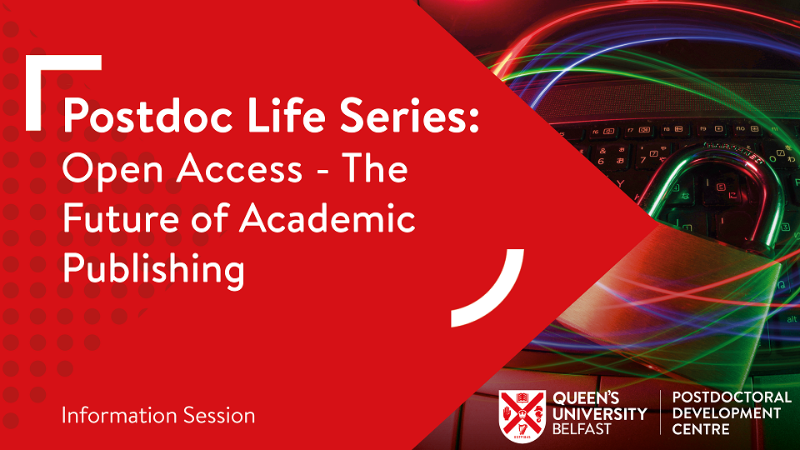
The recording of this information session designed for postdocs and research staff provides some background information on Open Access publishing, the different options for researchers to publish Open Access as well as the University's position and support available, including via publishing deal and Open Access funding.
Watch 'Postdoc life: Open access - The future of academic publishing'
Open access (OA) is a way to achieve free access to research. OA literature is available in a digital format online, free of charge, and free of most copyright and licensing restrictions.
The research sector is increasingly adopting OA publishing as best practice, and most public funders require that the work they fund is published Open Access.
Academics and researchers have seen OA publication raise the profile of their work, attracting more citations by the research community, but also widening their reach beyond academia, including with policy makers and mainstream media.
When planning to publish research, it is important for academics and research staff to follow their funders' requirements and publish OA as much as possible, as well as to consider their options for OA publishing before choosing a journal, as this can have financial implications.
The video is presented by Stephen Gorman, a member of Queen's Open Research Team based in the McClay Library. Stephen is responsible for managing the University's Open Access block grants, Read and Publish deals, and Open Access agreements. A key part of his role is to provide training and support to Queen's researchers on all aspects of open access, including research funders' open access policies.
Details:
- Chapter 1: Introduction to open research
- Chapter 2: How to make your research Open Access - publishing options
- Chapter 3: Open Access and support available at Queen's
- Chapter 4: The future
- Chapter 5: Questions and answers (other outputs: books, data, code)
- Chapter 6: Questions and answers (OA and inequalities)
- Chapter 7: Questions and answers (the future of academic publishing)
For further information:
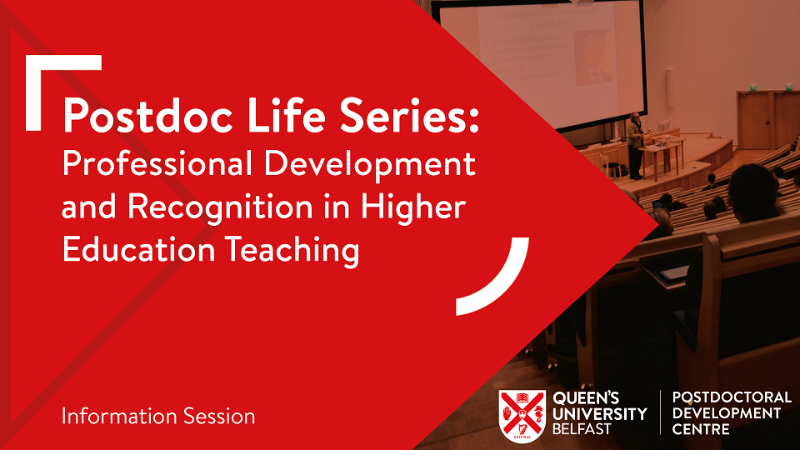
The recording of this information session designed for postdocs and research staff highlights some of the internal development and recognition/ accreditations related to teaching practice. This includes the HEA Fellowship Scheme and the PostGraduate Certificate in Higher Education Teaching. It also discusses how and why it may be relevant to get involved with teaching as a postdoc.
Watch 'Postdoc life: Professional development and recognition in Higher Education teaching'
Gaining teaching experience and awareness of good teaching practice in higher education is key to research staff aiming at an academic career. The Centre for Educational Development (CED) at Queen's provides courses to develop teaching skills and supports applications for individuals to become Associate Fellows (or Fellows) of the Higher Education Academy (HEA), which is an internationally recognised teaching certification listed as desirable criteria in most lectureship job descriptions. In this video, Karen Fraser, Senior Educational Developer in the Centre for Educational Development, describes some of the development programmes and certification routes available, notably via the Queen's Merit Award.
Note: some questions were answered during the presentation, so content does not always fit perfectly within the defined chapters.
Details:
- Chapter 1: Introduction
- Chapter 2: Higher Education Academy (HEA) Fellowship scheme. Overview of the scheme, eligibility and process for research staff to validate their teaching experience and skills for free by becoming AF-HEA through the Queen's Merit Award (QMA).
- Chapter 3: PostGraduate Certificate in Higher Education Teaching (PGCHET). The PGCHET is a formal qualification, mainly directed at new academic staff on probation, for whom teaching is an essential part of their role (Note: in 2024, this programme was suspended; it will be updated and relaunched but the timeline for this isn't known).
- Chapter 4: Categories of staff eligible
- Chapter 5: Additional development programmes related to teaching and learning
- Chapter 6: Summary and how to get teaching opportunities as a postdoc
- Chapter 7: Questions and Answers
For further information:
- Visit the PDC's 'Teaching and Supervision' page
- Visit the CED website
- Contact Ben, responsible for organising QMA accreditation programmes (qma@qub.ac.uk)
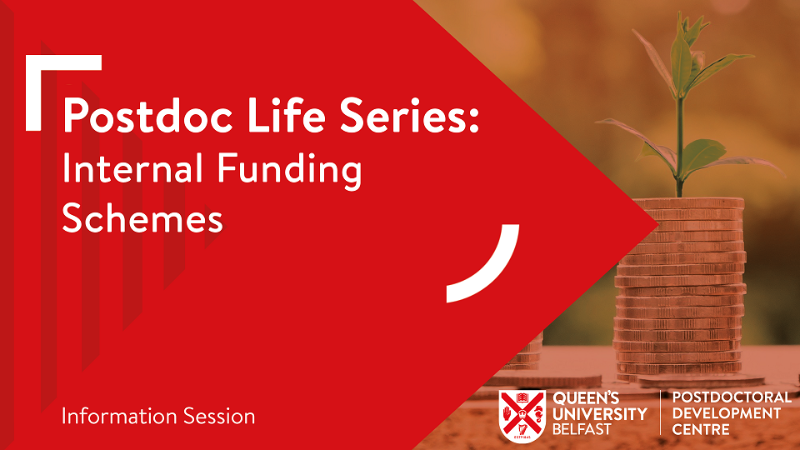
The recording of this information session designed for postdocs and research staff highlights some of the internal funding schemes they are eligible to apply for: the Research and Innovation Conference Fund, the Engaged Research Seed Fund, and the Agility Fund.
Watch 'Postdoc life: internal funding schemes'
In line with Queen's work on Research Culture, internal funding schemes were streamlined in 2022, and the application criteria has been widened to all staff involved in research. This enabled inclusion of postdocs and research staff, where previously only academic staff could apply. For research staff, these small pots of money with straightforward applications are a great way to write their first proposals, build a track-record of applying and securing funding, and receiving the budget required to bring some of their ideas to life and develop their career and CV. The internal funding schemes presented at this session fund a large range of activities, including presenting at conferences, organising public engagement activities, meeting potential collaborators, generating preliminary data for a fellowship application and training etc.
Details:
- Chapter 1: Patricia McCrory, member of the Research Development Team, discusses the Agility Fund, which is an internal funding allocation that aims to provide a steady source of internal support for research and innovation activities. Patricia provides an overview of the Agility Fund, the support available and the application process.
- Chapter 2: James Dillon, Senior Research Impact and Engagement Manager, provides an overview of the Engaged Research Seed Fund, outlining the eligibility and application procedure. James provides some examples of funded projects and describes the importance of these activities in the engagement and impact landscape, and the professional development of research colleagues.
- Chapter 3: Chris Browne, Senior Research Strategy and Policy Manager, provides a short overview of the Research and Innovation Conference Fund, including an explanation of the guidance and criteria and application/funding process. This touches on the rationale for having this Fund, why the University wants to promote conference attendance, and the expectations regarding how it will benefit the broader research culture and quality.